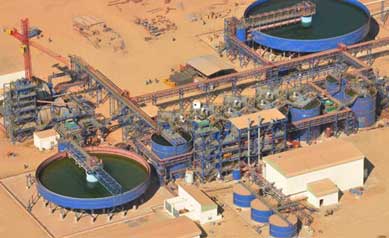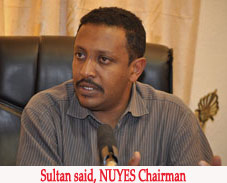Nevsun’s Militarized Commerce And Slave Labor In Eritrea

In a response to a Bloomberg News report that QKR Corporation was in talks with Nevsun and close to making a $1-billion bid, on Nov. 20, 2014, Nevsun disclosed that it “recently received from various parties expressions of interest on a potential corporate transaction“. It added, “Nevsun does not intend to comment further on potential corporate transactions unless and until it deems further disclosure is appropriate or required by applicable law.”
QKR is a mining fund headed by a former JPMorgan Chase & Co. banker and partly bankrolled by Qatar’s sovereign wealth fund and Kulczyk Investments, founded by the controversial polish oligarch, Jan Kulczyk, who holds investment portfolios in mineral resources and energy in Africa and elsewhere. According to Forbes magazine, Mr. Kulczyk, the richest man in Poland, amassed his fortune in the 1990s during the privatization of Poland’s state enterprises.
According to observers, facing multiple lawsuits, human rights criticism, and UN scrutiny, Nevsun has been actively pursuing a business strategy of positioning itself as an attractive target for a takeover by investors with the hope of becoming a privately held company.
The two reasons for this move are believed to be an escape from legal and media scrutiny and mitigate the single country risk factor by diversifying its portfolio to include other gold mines in Africa.
To achieve this objective, Nevsun had hired Kin Communications, an investor relation firm to bolster its battered image, and in 2011 started publishing annual Corporate Social Responsibility reports, comprising of an unaudited self-assessment of the company governance practice and uncorroborated stakeholders’ testimonies.
Recently, it hired an international lawyer who conducted an investigation into Amnesty International’s allegation. After two one-week visits to Eritrea and failing to interview a single victim of the alleged use of slave labor, the lawyer concluded the allegation was unfounded.
Last summer, Nevsun settled one of the dozen class action lawsuits on behalf of shareholder who alleged that Nevsun mislead investors by manipulating production schedule to overstate its earnings report.
This was not the first time Nevsun was accused of misleading investors. On a June 15, 2006 in a WikiLeaks cable, the American Ambassador to Eritrea, Scott de Lisi, described how a group of investors were hoodwinked by Nevsun and stated that “according to staff of the European Commission and the local director of the World Bank, the GSE [Government of the State of Eritrea] and Nevsun gave an Oscar-worthy performance which, in their view, mislead those who visited.”
As a privately held company, Nevsun would have little or no reporting requirements and obligations for transparency through annual reports and regulators filings. Unencumbered by oversight by an elected board of directors and not being required to disclose details about its operations and financial dealings, Nevsun will not be forced to disclose information on its shady practice with the Eritrean government.
As a 40% minority owner of Nevsun, Eritrea would welcome the opportunity for Nevsun to be privately owned in order to avoid compliance to international regulations. However, it is not clear if the Eritrean ruling party would allow the new owners to divest outside Eritrea. Nevsun is careful not to antagonize the ruling party for fear of nationalization of the Bisha mine, its single revenue generating asset located in Eritrea. It widely known that Eritrea has exercised similar threats when it forced the sale of the Australian mining company Chalice to China’s SFECO Group.
To date, Eritrea refuses to adhere to the policies of the Extractive Industries Transparency Initiative (EITI), which according to its website is “a global coalition of governments, companies and civil society working together to improve openness and accountable management of revenues from natural resources”. EITI has 31 member countries 21 of which are in Africa.
Militarized Commerce
Since it ended the gold production phase and moved to copper production, which requires more logistical support and infrastructure to export, Nevsun has relied on the Eritrean ministry of defense to provide it with slave labor for security and transportation services to move its production to the port of Massawa.
Every year the Eritrean government rounds up about 20,000 eleventh grade students to finish senior high school in Sawa military camp after which most of them are conscripted. The majority of the youth are sent to work for the ruling party’s companies which supply slave labor to Nevsun.
Segen Construction is the main contractor of Nevsun and it has thousands of slave labor that its assigns to its many projects.
For the past three years in anticipation for the need to transport copper across Eritrea, the Eritrean military has been using forced labor to make substantial road improvement and maintenance necessary to handle the massive truck traffic moving over Eritrea’s often narrow and winding escarpment roads.
The slave labor is extracted from conscripted Eritrean youth in programs overseen by ministry of defense. The appointment of Sebhat Ephrem, Eritrea’s former defense minister who recently became the minister of mining underscores Eritrea’s crucial reliance on mining revenues. With payment of close to half a billion dollars in the last three years to Eritrea, Nevsun has become a financial savior to the ruling party whose grip to power relies primarily on mining revenues from Nevsun and Diaspora remittance.
Nevsun has always denied the presence of military units in Bisha mines. However, according to WikiLeaks cable from Asmara, “Eritrea’s government gave Nevsun a security team of 2000 persons, permanently stationed in the Bisha area”.
According to an international law expert, this mutually agreed upon engagement effectively renders Nevsun activities as engaging in militarized commerce and risks assuming the liability of these abuses. He further added that, “Nevsun’s officers would not be immune to criminal prosecution or civil litigation in Canada or elsewhere for abuses committed by security forces overseas.”
Modern Day Slavery
The recent lawsuit alleges that Nevsun used salve labor to build the Bisha mine. The complaint filed in Canada where Nevsun has corporate head office, will make potential acquirers to think twice especially considering the implications of sanctioning the use of slave labor supplied by its partner the Eritrean ruling party.
Nevsun’s CEO, Cliff Davis has denied the allegation of using slave labor though an entire generation of Eritreans whose labor was forcefully extracted under the guise of “national service” bear testimony to the injuries. In the past, whenever a lawsuit is filed against Nevsun, Mr. Davis was quick to state that his company will vigorously defend itself only to settle out of court few months later.
Nevsun has been adamantly denying accusation of violating human rights of Eritreans and damaging the country’s environment. However, wells in the Bisha region are depleted of deep sweet water and wells now yield only salty water.
Indigenous residents of the area who have been stranded in Sudanese camps for over four decades lament at the graves of their ancestors that were unearthed to make way for Bisha’s open-pit mines.
An exiled resident from the area said, “we thought it was the Eritrean ruling party, but Canada is also abusing our ancestral lands.“



Awate Forum